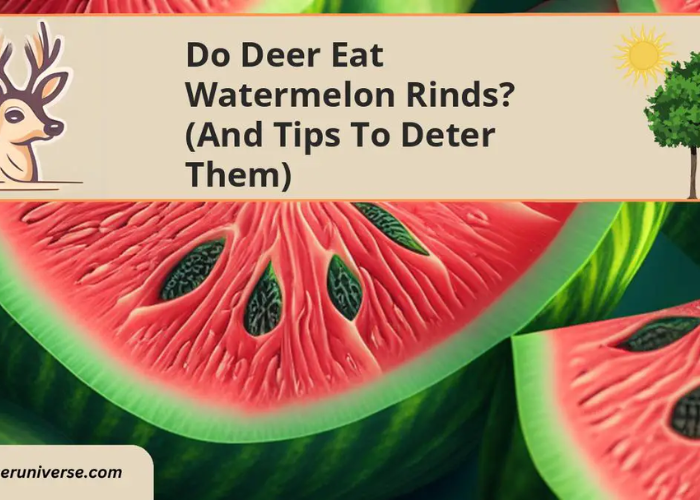This is a question that has been debated for a long time, and there are a lot of opinions out there. Some people believe that deer love to chow down on watermelon rinds, while others think it’s not a good idea. In this blog, we will explore both sides of the debate and investigate whether or not deer really do eat watermelon rinds.
What Watermelon Rind Is
Watermelon rind is the green, tough skin of a watermelon that is often discarded in the process of eating the juicy, sweet red flesh of the melon. It is a thick, waxy, and strong outer layer of the melon that protects the flesh within.
Rinds are edible and have a mild, crunchy texture with a slightly sweet taste. People often eat watermelon rind raw or pickled, cooked, or blended in smoothies or juices. Watermelon rinds are an excellent source of vitamin C, dietary fiber, and potassium, making them a healthy addition to any diet.
So, the answer to the question “Do deer eat watermelon rinds?” is yes, deer will eat watermelon rinds, as they contain many beneficial nutrients.
Do Deer Eat Watermelon Rinds?
The answer to the question of whether or not deer eat watermelon rinds is a bit complicated. While deer are omnivorous and will gladly consume a variety of fruits and vegetables, the answer to this question is “It depends”.
If a deer has access to the fruit itself, then it will likely choose to consume the sweet flesh of the watermelon instead. On the other hand, if the fruit has already been consumed and the deer is presented with the rind, they may still consume it depending on if the watermelon rind is in a state that is palatable to them. The watermelon rind must be fresh and not overly processed or dried out in order for the deer to find it edible.
Why Deer Don’t Prefer Watermelon Rinds
While deer may eat watermelon rinds if they are desperate for nourishment, it is not their preferred choice of food. Watermelon rinds contain a waxy outer coating that makes them difficult to digest, making it difficult for deer to extract the nutrients they need.
Additionally, watermelon rinds are typically very hard; deer have difficulty chewing them and may even injure their teeth in the process. Furthermore, watermelon rinds contain large amounts of sugar, which can be harmful to a deer’s health if consumed in large quantities.
For these reasons, deer are likely to avoid watermelon rinds and look for other, more appetizing food sources.
Possible Benefits of Eating Watermelon Rind for Deer
Though watermelon rinds are not a typical food choice for deer, they can benefit from eating them. If deer consume watermelon rind, they can gain a variety of vitamins and minerals that are not as readily available in their natural diet.
Watermelon rinds contain vitamins A, B, and C, as well as essential minerals such as potassium, calcium, magnesium, and sodium. These vitamins and minerals can help the deer to stay healthy and strong.
Additionally, the fiber in watermelon rind can help regulate digestion and improve the deer’s overall health. The water in the watermelon rind can also help the deer stay hydrated, especially during the summer months when there are fewer sources of fresh water available.
Eating watermelon rind can also provide the deer with a source of energy, as it contains sugar, which can provide the animal with a quick burst of energy.
Where to Find Watermelon Rinds for Deer
Watermelon rinds are a nutritious and delicious snack for deer and can be found in many places. If you want to offer watermelon rinds to deer, the first place to look is in your local grocery store.
Most stores carry pre-cut and packaged watermelon rinds that are ready for feeding. If you want to purchase fresh watermelon rinds, you can look for produce markets that specialize in watermelons. Watermelon farmers may also have extra rinds available for sale.
Another option is to purchase watermelon rinds from online retailers that specialize in deer-friendly products. No matter where you purchase them, remember to always wash watermelon rinds before feeding them to deer!
How to Feed Watermelon Rinds to Deer
If you’re looking for a way to feed watermelon rinds to deer, then you’re in luck! Deer are naturally attracted to the sweet smell of watermelon and will happily eat the rinds. To make it easier for them to access and enjoy the watermelon rinds, it’s best to cut them into smaller pieces so they can easily be eaten.
Additionally, you can also mash the rinds up to make them easier to digest. Just be sure to remove all of the seeds before offering them to the deer. This will help prevent any digestive issues and keep them healthy.
If you’re feeling extra generous, you can also add some other fruits and vegetables to the mix to make it more appealing. Deer loves apples, carrots, and even grapes!
Alternative Foods Deer Eat
Deer have a varied diet and can feed on a wide range of food sources. While they are mostly grazers, they can also eat fruits and vegetables. One of the alternative foods deer eat is watermelon rinds.
A deer’s diet consists of many different types of plants, including grasses, shrubs, herbs, and forbs. Watermelon rinds are a great source of fiber and also provide a good source of vitamins and minerals.
Deer are also attracted to the sweet taste of the watermelon rinds, which makes it a great alternative food source. While deer can eat watermelon rinds, it is important to note that they should not be the only food they eat. Deer need a variety of different plants to get the nutrients they need.
Conclusion
the answer to the question “Do deer eat watermelon rinds?” is yes, deer will eat watermelon rinds if given the opportunity. However, it is not a natural or preferred food for deer, and should not be relied upon to provide nutrition for them.
Watermelons are high in sugar content and can be a good source of hydration for deer in the summer months, but the rinds should not be considered a suitable food source for them. If you choose to offer watermelon rinds to deer, be sure to supplement their diet with other foods that are more nutrient-dense.
Related posts
Recent Posts
InformalNewz: A New Era of Unconventional News Reporting
In the ever-evolving landscape of media and journalism, new platforms and approaches are constantly emerging to meet the demands of…
Balanced Living: Strategies for Achieving Wellness in a Hectic World
In today’s fast-paced world, achieving a sense of balance can often feel like an elusive goal. Juggling work, family, social…



